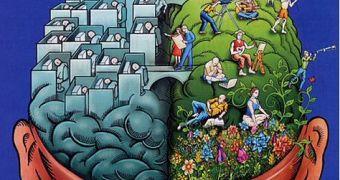A team of researchers at the UC Davis Center for Mind and Brain have found that there is a small area deep in the brain, called the perirhinal cortex, which is responsible for people's unconscious conceptual memories.
All people have this type of memories, that pop out when you least expect them; it's like associating what someone says with an image you have thought of before.
Until now, scientists believed that the perirhinal cortex was involved in conscious or 'declarative' memories, just like the neighboring hippocampus, but the study led by Wei-chun Wang, a graduate student at UC Davis, suggests that things might be a little more complex.
Along with his colleagues, Wang conducted memory tests on people diagnosed with amnesia and damage to the perirhinal cortex or other brain areas.
The researchers also carried out functional magnetic resonance imaging (fMRI) scans of healthy volunteers while they performed the same memory tests.
A typical test consisted in giving the participants a long list of words – like chair, table or spoon, and asking them to think about how pleasant they were.
A while later, they were asked to think up words in different categories, like 'furniture'.
The tests showed that amnesic people with damage to the perirhinal cortex had very poor performances on the tests, while the fMRI scans showed that the same brain area lit up in the healthy control subjects.
A declarative memory is when you remember being in a place you thought of – when you can actually say “I remember being there”.
This type of memories is affected when damage is done to the hippocampus, but the conceptual memory remain, said Wang.
And since the perirhinal cortex is just near the hippocampus, neurologists assumed that the same applied here too.
What this study actually does, Wang added, is establishing the way that memories are assembled in the brain, and how different sorts of brain damage can affect memory.
The example that he gives is Alzheimer’s, which most of the times, he says, affects the hippocampus and perirhinal cortex before other brain areas.
The findings were published in the journal Neuron.

 14 DAY TRIAL //
14 DAY TRIAL //